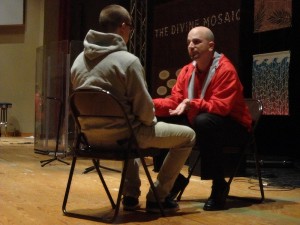
By Brad Crofford, Editor-in-chief
The quick touch of a paper clip to a finger. A long wait in line. A brief consultation.
These small things were designed to help inform the students who attended the HIV/AIDS testing simulation late in the evening on Monday, November 26 about the realities of HIV in Swaziland.
Harry (M.D.) and Echo (PA-C) VanderWal from The Luke Commission ran the simulation as if it were one of the clinics they run twice a week in Swaziland. According to its website, The Luke Commission “takes free health care and the Good News of Jesus Christ to the most isolated and underserved populations, in partnership with the Swazi people and the Ministry of Health.”
Director of the SNU Fund and Advancement Programs Brent LaVigne, who lived in Swaziland as part of the Swaziland Partnership, began the event by providing some context.
“Swaziland has the highest HIV infection rate in the world, about one in three people” LaVigne said. “In a country with no health care, the only barrier between life and death is your immune system.”
HIV takes away this protection, LaVigne explained. The problem is widespread. Unlike in the US where HIV is mostly found in certain high risks groups, one is surrounded by it in Swaziland, LaVigne said.
Such high rates has severe societal effects. Harry VanderWal noted later in the simulation that about 20 percent of all Swazis (and 40 percent of Swazi children) are orphans. His wife added that that is the equivalent of about 80 million people in the United States being orphaned.
As the simulation got underway, Harry VanderWal began by emphasizing God’s faithfulness.
“Whatever happens here today, God is there to help you,” Harry VanderWal said.
Students lined up to be “tested.” They lined up to have their fingers prodded with a paperclip (a fill-in for having blood drawn) by three students filling in as nurses. They then waited to get their results.
Though the simulation did not administer a real test, the room was near silent as people waited for their results. Feet bounced up and down as students read and reread the story of the person they represented. This waiting period was an important part of the simulation. While students only had to wait for about a half hour, Echo VanderWal said that in Swaziland “Sometimes our patients have to wait six to seven hours… It is gut-wrenching.”
“As I was trying to live into this African woman’s life, all I could think about were there thousands and thousands of children who live each day without a mom or dad because of this disease,” Junior urban ministries major Shelby Oxner said. “I couldn’t even begin to imagine what that might be like to sit and wait to see if I would be there to continue to provide for my children.”
After waiting, students went up one at a time to hear the results of their “test” from either Harry or Echo VanderWal. Even though not a real test, this moment was impactful for some of the students in attendance.
“I tested negative based on the results for the simulation,” junior English major Samuel Duce said. “I did not expect that at all. I felt silly, but I was strangely relieved.”
After the simulation, the VanderWals answered questions about their work in Swaziland. They have been working there for almost eight years and estimate that they have seen about 8,000 people test positive for HIV.
“Our part as The Luke Commission is to get people to test,” Echo VanderWal said. “We probably see more people in one day than the rest of the country… We test about 150 people a day, two days a week.”
Their modus operandi is to set up temporary clinics in rural schools. They provide numerous services in addition to HIV testing, which actually helps their HIV work.
“It helps to have it in a comprehensive setting,” Echo VanderWal said. “It’s more relaxing for the patient and makes them more willing to test.”
In terms of what needs to be done, the VanderWals named education about HIV as one of the key issues. They said that sometimes individuals are “thrown out of the house and ostracized” if they test positive.
They also cite funding as a way in which people can help. It costs about ten dollars to test one patient. According to LaVigne, SNU raised about $2,000 for such testing through its Two Dollar Tuesdays initiative last year.
Individuals can learn more about The Luke Commission through their website.